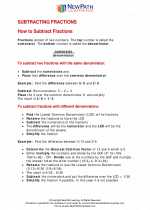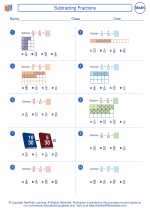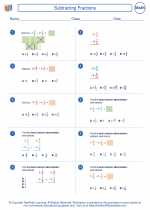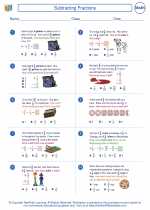Numbers
Numbers are the building blocks of mathematics. They help us count, measure, and solve problems. There are different types of numbers, each with its own unique properties and uses. Let's explore some of the key concepts related to numbers:
Types of Numbers
- Whole Numbers: These are the numbers 0, 1, 2, 3, 4, 5, and so on. They do not include fractions or decimals.
- Integers: Integers are whole numbers and their negative counterparts, along with zero. For example: ... -3, -2, -1, 0, 1, 2, 3 ...
- Rational Numbers: These are numbers that can be expressed as a fraction of two integers, where the denominator is not zero. For example: 1/2, 3/4, 5/3, etc.
- Real Numbers: Real numbers include all rational and irrational numbers. They can be positive, negative, or zero, and can be expressed as decimals.
- Irrational Numbers: These are numbers that cannot be expressed as a fraction. The decimal representation of irrational numbers goes on forever without repeating. The most famous irrational number is π (pi).
Operations with Numbers
There are four basic operations that can be performed with numbers:
- Addition: Combining two or more numbers to find their total sum.
- Subtraction: Taking one number away from another to find the difference.
- Multiplication: Repeated addition of a number. For example, 3 × 4 means adding 3 to itself 4 times.
- Division: Sharing or grouping a number into equal parts. For example, 12 ÷ 4 means dividing 12 into 4 equal groups.
Properties of Numbers
Numbers have certain properties that help us work with them more easily:
- Commutative Property: The order of numbers can be changed without affecting the result of addition or multiplication. For example, a + b = b + a.
- Associative Property: The grouping of numbers can be changed without affecting the result of addition or multiplication. For example, (a + b) + c = a + (b + c).
- Distributive Property: Multiplication can be distributed over addition. For example, a × (b + c) = a × b + a × c.
- Identity Property: The sum of any number and zero is the number itself. Similarly, the product of any number and 1 is the number itself.
Place Value
Understanding place value is crucial for working with numbers. In our base-10 number system, each digit's value depends on its position in the number:
- The rightmost digit is in the ones place and represents the ones value.
- The next digit to the left is in the tens place and represents the tens value (10 times the digit's value).
- This pattern continues to the left, with each place value being 10 times the value of the place to its right.
For example, in the number 532, the 5 is in the hundreds place, the 3 is in the tens place, and the 2 is in the ones place.
Prime and Composite Numbers
Prime numbers are numbers greater than 1 that have no positive divisors other than 1 and themselves. Examples include 2, 3, 5, 7, 11, and so on. Composite numbers, on the other hand, have more than two positive divisors. For example, 4, 6, 8, and 9 are composite numbers.
Study Tips:
- Practice identifying different types of numbers and understanding their properties.
- Work on mental math to improve your arithmetic skills.
- Understand the relationship between different operations and how they interact with each other.
- Practice converting between different forms of numbers, such as fractions, decimals, and percentages.
- Learn and memorize the properties of numbers to make problem-solving easier.
By understanding the different types of numbers, their properties, and how to work with them, you'll be well-equipped to tackle more advanced mathematical concepts in the future!
[Numbers] Related Worksheets and Study Guides:
.◂Math Worksheets and Study Guides Fifth Grade. Subtracting Fractions

 Worksheet/Answer key
Worksheet/Answer key
 Worksheet/Answer key
Worksheet/Answer key
 Worksheet/Answer key
Worksheet/Answer key
